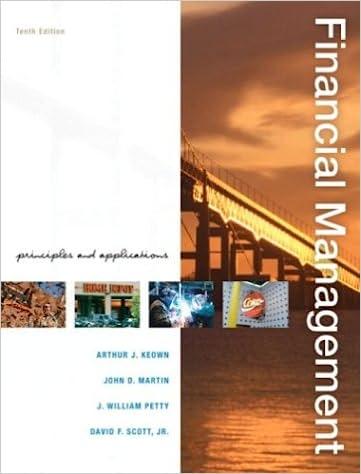If you're an automaker, you've got to be ready for the next generation of cars. While they
Question:
If you're an automaker, you've got to be ready for the next generation of cars. While they may be extremely efficient gas-powered vehicles, they could also be a hybrid-gas and electricity pow- ered or even propelled by electricity generated by a hydrogen-oxygen chemical reaction. Given all the uncertainty associated with the future direction of automobiles and how they will be pow- ered, it only makes sense to explore all avenues and make sure you're not left behind. That is, if you want to be a leader in this market and if it does in fact develop, you'll have an early presence in it, developing and refining your potential product line. That's the whole idea behind an option to expand a product line. In the fuel-efficient automobile market, the Toyota Prius and the Honda Insight have taken the initial lead, with Ford's Prodigy, GM's Precipt, and now Daimler's ESX3 entering the competi- tion. This is not an inexpensive effort; in fact, it has been estimated that the Toyota Prius, which employs an expensive electric-alone drive for much of its duty cycle, produces a loss per vehicle sold of approximately $10,000. Thinking about the discussion in this chapter dealing with the option to expand a product, why do you think they are willing to take on this type of loss- producing project? Does this make sense to you?If you're an automaker, you've got to be ready for the next generation of cars. While they may be extremely efficient gas-powered vehicles, they could also be a hybrid-gas and electricity pow- ered or even propelled by electricity generated by a hydrogen-oxygen chemical reaction. Given all the uncertainty associated with the future direction of automobiles and how they will be pow- ered, it only makes sense to explore all avenues and make sure you're not left behind. That is, if you want to be a leader in this market and if it does in fact develop, you'll have an early presence in it, developing and refining your potential product line. That's the whole idea behind an option to expand a product line. In the fuel-efficient automobile market, the Toyota Prius and the Honda Insight have taken the initial lead, with Ford's Prodigy, GM's Precipt, and now Daimler's ESX3 entering the competi- tion. This is not an inexpensive effort; in fact, it has been estimated that the Toyota Prius, which employs an expensive electric-alone drive for much of its duty cycle, produces a loss per vehicle sold of approximately $10,000. Thinking about the discussion in this chapter dealing with the option to expand a product, why do you think they are willing to take on this type of loss- producing project? Does this make sense to you?
Now take a look at some of the different products being developed in this area. Which ones do you think have the highest chance of success? For example, Honda's new FCX car (hondacorporate.com/?onload-fex) works on fuel cells. Check out how they work at www.howstuffworks.com/fuel-cell.htm. Also, take a look at what Toyota is doing at www.toyota.com and also look at what Ford is doing (www.ford.com/en/innovation/engine Fuel Technology/default.htm). In addition, check out GM's new efforts (www.gmev.com/). Has your opinion on whether or not these are appropriate projects to take on changed at all?
Step by Step Answer:

Financial Management Principles And Applications
ISBN: 9780131450653
10th Edition
Authors: Arthur J. Keown, J. William Petty, John D. Martin, Jr. Scott, David F.





